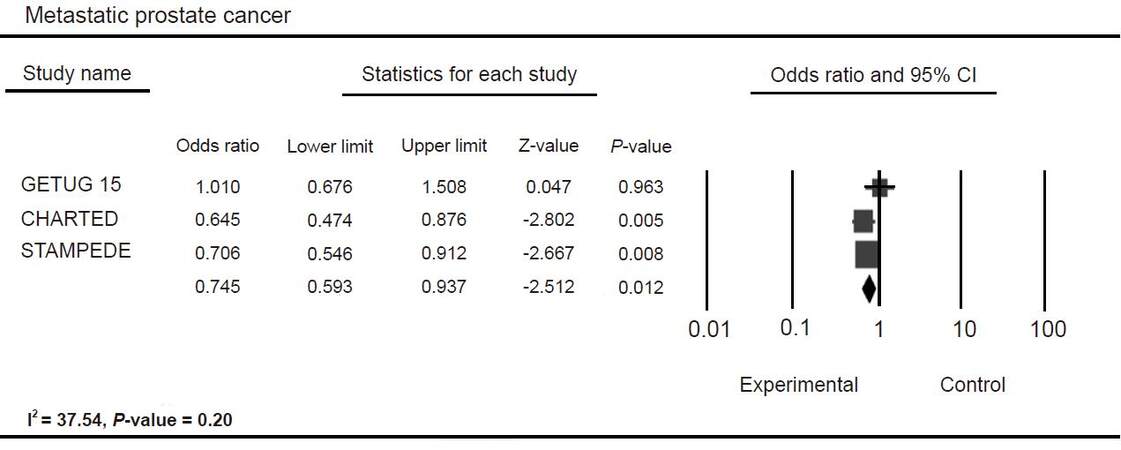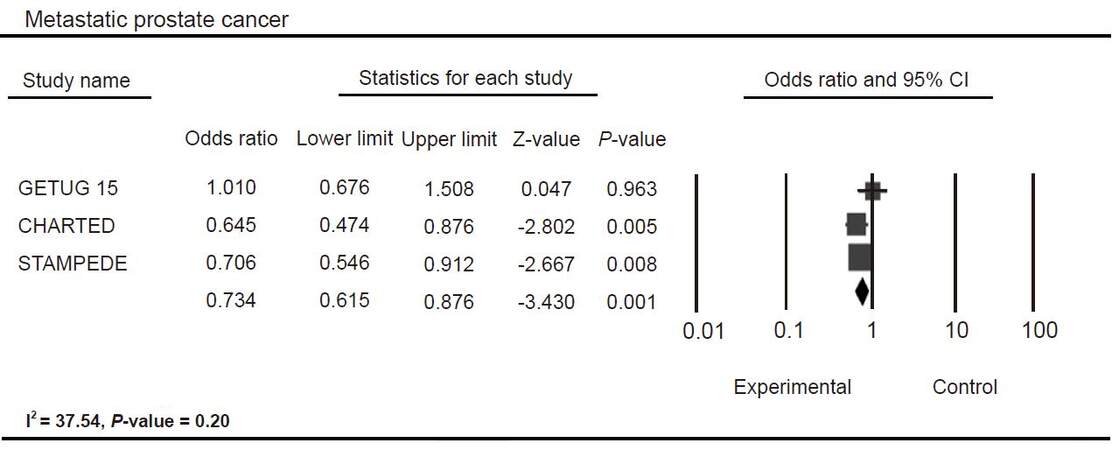Hormone naïve metastatic prostate cancer: can results of meta-analyses of aggregate data convince oncologists to expand the role of docetaxel?
Abstract
Aim: Results of trial investigating addition of docetaxel (D) to androgen deprivation therapy (ADT) in patients with hormone naïve metastatic prostate cancer have been inconsistent. Thus meta-analysis is expected to settle the controversy.
Methods: In this report, the authors highlight the results of randomized phase III trials and the results of recently published aggregated data meta-analysis (ADM) performed by the same investigators of these trials. In addition, the authors present and discuss the results of their own independent ADM. Three randomized phase III trials were identified. Only patients with metastatic (M1) disease were included. Comprehensive meta-analysis version 3.0 was used to perform the ADM. The primary endpoint of interest was overall survival (OS).
Results: The trials included a total 2,261 patients with M1 disease. Median follow up ranged between 29 and 50 months. Random effect model showed that ADT+D improved OS compared to ADT alone (Odds Ratio 0.745; 95% Confidence Interval: 0.593-0.937; P = 0.012).
Conclusion: The independent ADM confirms the OS benefit of adding D to ADT in patients with hormone naïve metastatic prostate cancer. Individual patient meta-analysis is likely to identify subgroups of patients who benefit more from this approach.
Keywords
Introduction
Prostate cancer is the most prevalent malignancy in males and is a leading cause of cancer mortality worldwide.[1,2] Androgen deprivation therapy (ADT) is the standard initial treatment for men with advanced/metastatic disease.[3] Eventually, the disease becomes resistant to castration with median progression free survival of 18-20 months.[4]
Docetaxel (D) was the first chemotherapeutic agent to improve overall survival (OS) when compared with mitoxantrone and is the standard of care for patients with castrate resistant prostate cancer.[5,6] This has encouraged investigators to test D in an earlier setting, i.e. in addition to ADT for patients with chemo-naïve and hormone naïve advanced/metastatic prostate cancer. The results of these trials and of a recent aggregated data meta-analysis (ADM) performed by the same investigators initiated a debate on the efficacy of this approach.[7]
We conducted an aggregated data meta-analysis of reported phase III randomized controlled trials (RCTs) assessing the efficacy of this approach exclusively in patients with metastatic (M1) disease.
Methods
Studies that met all of the following criteria were included: (1) Randomized controlled trial (2) Study population of hormone naïve M1 prostate cancer. Subpopulation with advanced but non-metastatic disease were eliminated (3) Comparison between ADT alone and ADT with D chemotherapy (ADT+D) (4) Reported quantitative results in full published paper or as an abstract in a major oncology conference. Studies addressing the use of D in adjuvant (non-advanced and non-metastatic) setting were excluded.
Two authors (Jamal Zekri & Imran Ahmad) performed independent extensive electronic data search of the following sources: MEDLINE, Annual American Society of Clinical Oncology (ASCO) conference, Genitourinary ASCO conference, European Cancer Congress and European Society of Medical Oncology conference. The search covered the period from January 2004 until December 2015 (inclusive). Both authors reviewed the identified data and reached an agreement on the data to be included as per the above inclusion criteria. Three authors (Jamal Zekri, Imran Ahmad & Saba Imtiaz) reviewed the eligible publications and extracted the relevant information for analysis.
Comprehensive meta-analysis version 3.0 was used by an independent clinical research coordinator. The primary endpoint of interest was OS. Random effect model was selected as the primary outcome due to differences in sample sizes of the trials. Additional fixed effect model analysis was also performed. All authors reviewed and discussed the results prior to writing the manuscript.
Results
Three RCTs fulfilled the inclusion criteria and were then subjected to meta-analysis.[8-10] The trials included a total of 2,951 patients. Two thousand two hundred and sixty-one patients were eligible for the meta-analysis after eliminating 690 patients with advanced but non-metastatic disease in one of the 3 trials.[10] One thousand three hundred and ten patients were in ADT arms and 951 in ADT+D arms. Characteristics of included studies and patients are illustrated in Table 1.
ADT+D improved OS compared to ADT alone (Odds Ratio 0.745; 95% Confidence Interval (CI): 0.593-0.937; P = 0.012) [Figure 1]. Additional fixed effect model analysis showed similar results (Odds Ratio 0.734: 95% CI: 0.615- 0.876; P = 0.001) [Figure 2]. The index I-squared was 37.54 indicating lack of heterogeneity among the trials.
Phase III trials investigating the addition of docetaxel to ADT in hormone naïve advanced/metastatic prostate cancer
| Trial (treatment arm) | Number of patients | Median follow up (months) | Median overall survival (months) | Number of events | Statistics |
|---|---|---|---|---|---|
| GETUG 15 (ADT) | 193 | 50 | 54.2 | 88 | HR 1.01 (0.750-1.36) P = 0.955 |
| GETUG 15 (ADT+D) | 192 | 50 | 58.9 | 88 | |
| CHAARTED (ADT) | 393 | 29 | 44 | 136 | HR 0.61 (0.47-0.8) P = 0.0003 |
| CHAARTED (ADT+D) | 397 | 29 | 57.6 | 101 | |
| STAMPEDE (ADT) | 724 | 42 | 45 | 405 | HR 0.76 (0.62-0.92) P = 0.003 |
| STAMPEDE (ADT+D) | 362 | 42 | 60 | 165 |
Discussion
Theoretically chemotherapy may eradicate clones of malignant cells that are not responsive to ADT alone. On the other hand, there is concern that ADT may take cancer cells out of cell cycle and make them unresponsive to chemotherapy.
The development of effective chemotherapy treatment for metastatic castrate resistant prostate cancer (mCRPC) provides the rationale for investigating its effect in earlier hormone naive setting. D is the most effective first line chemotherapeutic agent for patients with mCRPC and thus is the best candidate to be tested in these patients. Three randomized trials reported the results of this approach. The earliest published results were that of the Groupe d’Etude des Tumeurs Uro-Genital et Association Française d’Urologie (GETUG-AFU) 15 in 2013 showing no significant improvement in OS by adding D to ADT.[8] In contrast, recent reports of the CHAARTED and STAMPEDE trials showed significant OS benefit by adding D.[9,10] In general, meta-analysis has the potential to provide more precise estimate of the effect of a treatment than any individual study alone.[11] The investigators of the above trials performed ADM analyzing multiple therapeutic interventions (Zoledronic acid and D) in a broad spectrum of clinical settings (M0 and M1). We specifically focused on the role of D in patients with M1 disease only.
We do not possess individual patient data and thus we conducted an ADM. The median follow up of reported CHAARTED and STAMPEDE was 29 and 42 months respectively. For this reason, we decided to include the results GETUG-AFU 15 published after median follow up of 50 months and not the latest presentation after a median follow up of 80 months.[12]
Our results confirmed the OS benefit of D (Odds Ratio 0.745; 95% CI: 0.593-0.937; P = 0.012) [Figure 1]. Due to lack of heterogeneity among trials (index I-squared 37.54) we conducted additional fixed effect model analysis which gives more weight to larger trials.[13] Both random and fixed effect models yielded similar outcome [Figure 2]. The results provide further evidence for adding D to ADT as part of the initial therapy for men with M1 disease.
These findings may not be unexpected because the 2 larger CHAARTED and STAMPEDE trials had similar outcome and the smallest GETUG-AFU 15 (385 patients) showed numerical difference in favor of adding D (58.9 vs. 54.2 months; HR 1.01, 95% CI 0.75-1.36).
There are a number of differences between the 3 trials [Table 2]. One important difference is that STAMPEDE had broader enrollment criteria. Patients with non-metastatic disease (M0) were eligible if they had 2 or more of the following criteria: stage T3/4, prostate specific antigen ≥ 40 and Gleason score 8-10. Twenty four percent and 17% of all patients recruited to the 6 arms of STAMPEDE trial had N0M0 and N+M0 stage respectively. There was no benefit from adding D to ADT (HR 0.95, 95% CI 0.62-1.47) in these groups.[10] Only 1,086 (61%) patients had M1 disease and were included in our ADM. These differences may limit the interpretation of any collective ADM. Individual patient data (IPD) meta-analysis can overcome this challenge and allows analysis of different patient subgroups.
Summary of reported patient characteristics and treatment
| GETUG-AFU 15 | CHAARTED | STAMPEDE | ||||
|---|---|---|---|---|---|---|
| ADT | ADT+D | ADT | ADT+D | ADT | ADT+D | |
| Number of patients | 193 | 192 | 393 | 397 | 1184 (M1:724) | 592 (M1:362) |
| Median age (years) | 64 | 63 | 63 | 64 | 65 | 65 |
| PS | Karnofsky ≥ 70% | ECOG 0-2 | WHO 0-2 | |||
| Gleason score | ||||||
| ≤ 7 | 41% | 45% | 27% | 29% | 24% | 20% |
| 8-10 | 59% | 55% | 63% | 61% | 68% | 73% |
| Metastases | 100% | 100% | 61% | |||
| Metatstaic sites | ||||||
| -Bones | 81% | 81% | Visceral | Visceral | 54% | 52% |
| -Nodes | 56% | 52% | 17% | 14% | 19% | 19% |
| -Lung | 11% | 11% | 3% | 2% | ||
| -Liver | 2% | 5% | 1% | 1% | ||
| Volume of metastases | ||||||
| High | 47% | 48% | 36% | 34% | ||
| Low | 53% | 52% | 64% | 66% | NR | |
| Docetaxel | Up to 9 cycles | Maximum 6 cycles | 6 cycles | |||
| Daily Prednisone | No | No | Yes | |||
A very interesting observation in the CHAARTED trial is the differential effect of D according to the metastatic disease volume. High volume disease (HVD) was defined as visceral metastases and/or 4 or more bone metastases (at least 1 beyond pelvis and vertebral column). The addition of D improved OS of patients with HVD and not in those with low volume disease (LVD) (HVD: 49.2 vs. 32.2 months; P = 0.0006 and LVD: not reached in both treatment arm; P = 0.1398).[8] The observation encouraged the GETUG-AFU 15 investigators to conduct a retrospective analysis of outcome according to metastatic disease volume. After median follow up of 80 months, D did not significantly improve OS in patients with HVD (39 vs. 35.1 months; P = 0.35).[12] Possible explanations for the contrasting results include the substantial use of salvage D in GETUG-AFU 15 and that the study was underpowered to detect a difference in HVD subgroup. STAMPEDE, the largest of all 3 trials did not report the outcome in patients according to metastatic disease volume. Any future IPD meta-analysis will very likely concentrate on metastatic disease volume subgroups analysis.
A panel of 41 prostate cancer experts from 17 countries identified the management of hormone naïve metastatic prostate cancer as one of the controversial subjects. Their final recommendations were recently published and they reflect the differences in opinions. Half of the panel recommended the addition of D to ADT in M1 patients with HVD while 11% did not. In patients with LVD, 74% of the panelists did not recommend routine use of D with ADT.[14]
Another consideration is that any benefit obtained from adding D was not without cost as it was associated with a higher frequency of serious adverse events. For example, in STAMPEDE trial 51% and 31% of assessable patients in ADT+D and ADT alone arms respectively experienced ≥ grade III adverse events.
Further individual and/or combined detailed analysis of these 3 trials may identify subgroups of patients who benefit more from up front D. This will facilitate the estimation of potential risk/benefit effects and the discussion with relevant patients who are considering this approach.
In conclusion and within the limitation of ADM, the addition of D to ADT improves OS in patients with hormone naïve metastatic prostate cancer. This strategy should be discussed with patients who can tolerate chemotherapy.
Acknowledgments
Special thanks to Rawan AlSaadi (B.SC) for statistical analysis.
Financial support and sponsorship
None.
Conflicts of interest
There are no conflicts of interest.
Patient consent
Not relevant. This meta-analysis is a statistical systemic review of results of published trials. There was no access to patients and thus no consent.
Ethics approval
Not relevant. This meta-analysis is a statistical systemic review of results of published trials that were not conducted in the authors’ institution and are available in the literature.
REFERENCES
1. DeSantis CE, Lin CC, Mariotto AB, Siegel RL, Stein KD, Kramer JL, Alteri R, Robbins AS, Jemal A. Cancer treatment and survivorship statistics, 2014. CA Cancer J Clin 2014;64:252-71.
2. Torre LA, Bray F, Siegel RL, Ferlay J, Lortet-Tieulent J, Jemal A. Global cancer statistics, 2012. CA Cancer J Clin 2015;65:87-108.
3. Maximum androgen blockade in advanced prostate cancer: an overview of the randomised trials. Prostate Cancer Trialists' Collaborative Group. Lancet 2000;355:1491-8.
4. Eisenberger MA, Blumenstein BA, Crawford ED, Miller G, McLeod DG, Loehrer PJ, Wilding G, Sears K, Culkin DJ, Thompson IM Jr, Bueschen AJ, Lowe BA. Bilateral orchiectomy with or without flutamide for metastatic prostate cancer. N Engl J Med 1998;339:1036-42.
5. Tannock IF, de Wit R, Berry WR, Horti J, Pluzanska A, Chi KN, Oudard S, Théodore C, James ND, Turesson I, Rosenthal MA, Eisenberger MA; TAX 327 Investigators. Docetaxel plus prednisone or mitoxantrone plus prednisone for advanced prostate cancer. N Engl J Med 2004;351:1502-12.
6. Petrylak DP, Tangen CM, Hussain MHA, Lara PN, Jones JA, Taplin ME, Burch PA, Berry D, Moinpour C, Kohli M, Benson MC, Small EJ, Raghavan D, Crawford ED. Docetaxel and estramustine compared with mitoxantrone and prednisone for advanced refractory prostate cancer. N Engl J Med 2004;351:1513-1520.
7. Vale CL, Burdett S, Rydzewska LHM, Albiges L, Clarke NW, Fisher D, Fizazi K, Gravis G, James ND, Mason MD, Parmar MK, Sweeney CJ, Sydes MR, Tombal B, Tierney JF; STOpCaP Steering Group. Addition of docetaxel or bisphosphonates to standard of care in men with localised or metastatic, hormone-sensitive prostate cancer: a systematic review and meta-analyses of aggregate data. Lancet Oncol 2016;17:243-256.
8. Gravis G, Fizazi K, Joly F, Oudard S, Priou F, Esterni B, Latorzeff I, Delva R, Krakowski I, Laguerre B, Rolland F, Théodore C, Deplanque G, Ferrero JM, Pouessel D, Mourey L, Beuzeboc P, Zanetta S, Habibian M, Berdah JF, Dauba J, Baciuchka M, Platini C, Linassier C, Labourey JL, Machiels JP, El Kouri C, Ravaud A, Suc E, Eymard JC, Hasbini A, Bousquet G, Soulie M. Androgen-deprivation therapy alone or with docetaxel in non-castrate metastatic prostate cancer (GETUG-AFU 15): a randomised, open-label, phase 3 trial. Lancet Oncol 2013;14:149-158.
9. Sweeney CJ, Chen YH, Carducci M, Liu G, Jarrard DF, Eisenberger M, Wong YN, Hahn N, Kohli M, Cooney MM, Dreicer R, Vogelzang NJ, Picus J, Shevrin D, Hussain M, Garcia JA, DiPaola RS. Chemohormonal Therapy in Metastatic Hormone-Sensitive Prostate Cancer. N Engl J Med 2015;373:737-46.
10. James ND, Sydes MR, Clarke NW, Mason MD, Dearnaley DP, Spears MR, Ritchie AW, Parker CC, Russell JM, Attard G, de Bono J, Cross W, Jones RJ, Thalmann G, Amos C, Matheson D, Millman R, Alzouebi M, Beesley S, Birtle AJ, Brock S, Cathomas R, Chakraborti P, Chowdhury S, Cook A, Elliott T, Gale J, Gibbs S, Graham JD, Hetherington J, Hughes R, Laing R, McKinna F, McLaren DB, O'Sullivan JM, Parikh O, Peedell C, Protheroe A, Robinson AJ, Srihari N, Srinivasan R, Staffurth J, Sundar S, Tolan S, Tsang D, Wagstaff J, Parmar MK; STAMPEDE investigators. Addition of docetaxel, zoledronic acid, or both to first-line long-term hormone therapy in prostate cancer (STAMPEDE): survival results from an adaptive, multiarm, multistage, platform randomised controlled trial. Lancet 2016;387:1163-77.
12. Gravis G, Boher JM, Joly F, Soulié M, Albiges L, Priou F, Latorzeff I, Delva R, Krakowski I, Laguerre B, Rolland F, Théodore C, Deplanque G, Ferrero JM, Culine S, Mourey L, Beuzeboc P, Habibian M, Oudard S, Fizazi K; GETUG. Androgen Deprivation Therapy (ADT) Plus Docetaxel Versus ADT Alone in Metastatic Non castrate Prostate Cancer: Impact of Metastatic Burden and Long-term Survival Analysis of the Randomized Phase 3 GETUG-AFU15 Trial. Eur Urol 2016;70:256-62.
13. Higgins JP, Thompson SG. Quantifying heterogeneity in a meta-analysis. Stat Med 2002;21:1539-58.
14. Gillessen S, Omlin A, Attard G, de Bono JS, Efstathiou E, Fizazi K, Halabi S, Nelson PS, Sartor O, Smith MR, Soule HR, Akaza H, Beer TM, Beltran H, Chinnaiyan AM, Daugaard G, Davis ID, De Santis M, Drake CG, Eeles RA, Fanti S, Gleave ME, Heidenreich A, Hussain M, James ND, Lecouvet FE, Logothetis CJ, Mastris K, Nilsson S, Oh WK, Olmos D, Padhani AR, Parker C, Rubin MA, Schalken JA, Scher HI, Sella A, Shore ND, Small EJ, Sternberg CN, Suzuki H, Sweeney CJ, Tannock IF, Tombal B. Management of patients with advanced prostate cancer: recommendations of the St Gallen Advanced Prostate Cancer Consensus Conference (APCCC) 2015. Ann Oncol 2015;26:1589-604.
Cite This Article
Export citation file: BibTeX | RIS
OAE Style
Zekri J, Ahmad I, Imtiaz S. Hormone naïve metastatic prostate cancer: can results of meta-analyses of aggregate data convince oncologists to expand the role of docetaxel?. J Unexplored Med Data 2016;1:30-4. http://dx.doi.org/10.20517/2572-8180.2016.05
AMA Style
Zekri J, Ahmad I, Imtiaz S. Hormone naïve metastatic prostate cancer: can results of meta-analyses of aggregate data convince oncologists to expand the role of docetaxel?. Journal of Unexplored Medical Data. 2016; 1: 30-4. http://dx.doi.org/10.20517/2572-8180.2016.05
Chicago/Turabian Style
Zekri, Jamal, Imran Ahmad, Saba Imtiaz. 2016. "Hormone naïve metastatic prostate cancer: can results of meta-analyses of aggregate data convince oncologists to expand the role of docetaxel?" Journal of Unexplored Medical Data. 1: 30-4. http://dx.doi.org/10.20517/2572-8180.2016.05
ACS Style
Zekri, J.; Ahmad I.; Imtiaz S. Hormone naïve metastatic prostate cancer: can results of meta-analyses of aggregate data convince oncologists to expand the role of docetaxel?. J. Unexplored. Med. Data. 2016, 1, 30-4. http://dx.doi.org/10.20517/2572-8180.2016.05
About This Article
Copyright
Author Biographies

Data & Comments
Data

 Cite This Article 0 clicks
Cite This Article 0 clicks












Comments
Comments must be written in English. Spam, offensive content, impersonation, and private information will not be permitted. If any comment is reported and identified as inappropriate content by OAE staff, the comment will be removed without notice. If you have any queries or need any help, please contact us at support@oaepublish.com.